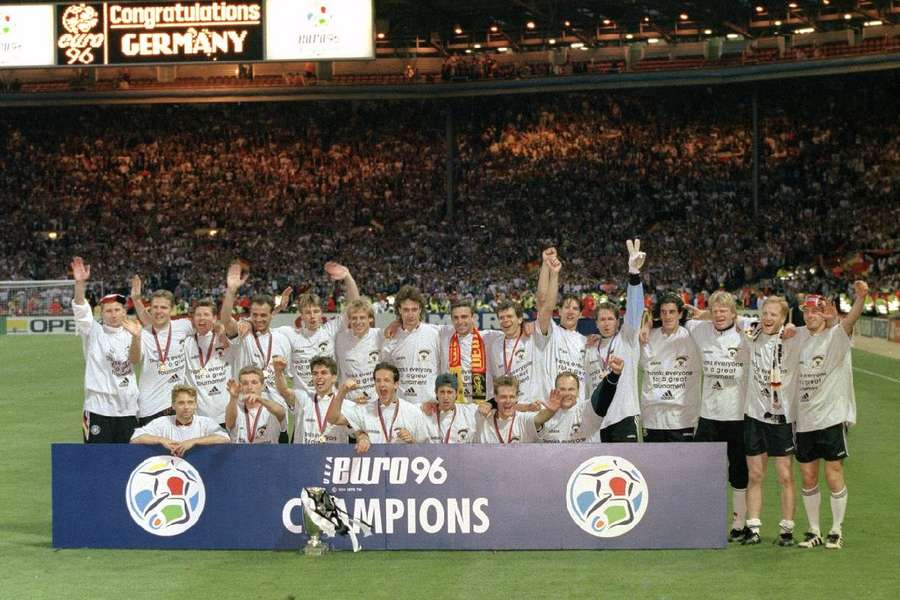The 10th edition of the European Football Championship took place in England from June 8th to 30th, 1996, with the final at Wembley Stadium won by Germany.
The expansion to 16 teams was not welcomed, and the stadiums were not full either, even during the knockout matches. With their triumph, the Germans became the masters of Europe for a third time and the national team with the most trophies in the competition.
Their last two cups had been won in 1972 and 1980, won by West Germany. With the reunification of the West and East on October 3rd, 1990, the Germans claimed their treble under the unified flag of Germany in England, the home of football.
Closer to the present day, Spain managed to catch up with Germany's three titles thanks to the tournaments won in 2008 and 2012. The first European Championship won by La Furia Roja was in 1964.
England denied at home by Germany
The Three Lions' national team experienced a real shock at home in the semi-final stage at Wembley Stadium when Terry Venables' side exited the competition to Germany on penalties.
At the end of 90 minutes, the score was tied 1-1, with Stefan Kuntz equalising for Germany in the 16th minute after Alan Shearer had opened the scoring for the hosts early on (3rd minute).
The Germans went on to win 6-5 on penalties, with England's decisive penalty missed by Gareth Southgate, the current national team coach.
Vogts' ambition brings success
Berti Vogts seemed destined to become Germany's coach. With a remarkable career at one club, Vogts played over 500 games in defence for Borussia Monchengladbach and amassed 96 caps for West Germany, winning Euro 72 and the 1974 World Cup.
After his retirement, he took charge of the German under-21 team and then became second in command of the national team. In 1990, when Franz Beckenbauer stepped down from the helm of the national team, Vogts was the obvious choice to succeed him.
Vogts' reputation is a controversial one, having twice been eliminated in the World Cup quarter-finals. While not a disastrous result, it marked a significant drop in Germany's performance, which had previously reached three consecutive finals.
Beckenbauer's prediction that the team would be "unbeatable" after the country's reunification seemed to go unfulfilled under Vogts. After this period, his achievements were modest, his club football activity was limited and his time coaching the Scottish national team was truly disastrous.
However, at Euro 96, Vogts showed commendable management. Externally, he skilfully managed players' egos and resisted pressure to bring back Lothar Matthaus, who was to make a surprise comeback at Euro 2000 at the age of 39.
Other players considered problematic, such as Bodo Illgner and Stefan Effenberg, were also left at home. On the pitch, Vogts created a system that suited his players and dealt effectively with selection problems caused by injuries and suspensions. He stressed the importance of pressing, a concept successfully implemented by few other teams at that tournament.
The first-ever golden goal
With a surprising yet remarkable run in the competition, after managing to eliminate Portugal in the quarter-finals and France in the semi-finals (via a penalty shoot-out), the Czech Republic came very close to producing a shock similar to that of the Danes in 1992.
In the final at Wembley, after a first half in which both sides played cautiously, it was not until the 59th minute that Patrik Berger broke the deadlock for the Czechs with a penalty won by Karel Poborsky.
Substitutions played a key role in the German camp. Although Vladimir Smicer, the Czechs' only substitution, missed a good chance to make it 2-0, coach Vogts' decision to introduce Oliver Bierhoff proved masterful.
Mehmet Scholl was replaced by Bierhoff, the latter becoming the unsung hero of the final. The striker was not popular in his home country, having spent the last five years in Italy, three of those seasons in Serie B with Udinese.
His national team debut came just four months before the tournament when he scored twice against Denmark. In the final at Wembley, Bierhoff needed just four minutes to level the scores with a header from a set-piece by Christian Ziege.
The true shock was to come in extra time shortly after the start of the first additional half.
In the 95th minute, Bierhoff received a ball inside the box from Jurgen Klinsmann. With his back to goal, he managed to turn and shoot towards goal, the ball being slightly deflected by Michal Hornak. At first, it looked like an easy ball for goalkeeper Petr Kouba to collect but, most likely fooled by the trajectory, he only managed to parry the ball into the far corner of the goal.
Thus, the first-ever golden goal was to be an extremely strange one. As the Germans celebrated, the Czechs called for an offside on Kuntz, telling Italian referee Pierluigi Pairetto that he had fouled Kouba in the build-up.
But the goal was given and Germany became European champions for the third time in history - the last Euro trophy the Germans have won until today.
Team of the Tournament:
Goalkeeper: Andreas Kopke (Germany)
Full-backs: Laurent Blanc (France), Marcel Desailly (France), Matthias Sammer (Germany), Paolo Maldini (Italy)
Midfielders: Paul Gascoigne (England), Dieter Eilts (Germany), Karel Poborsky (Czech Republic)
Forwards: Alan Shearer (England), Hristo Stoichkov (Bulgaria), Davor Suker (Croatia)
